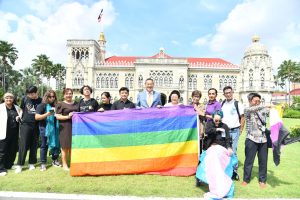Thailand’s Cabinet has approved a draft law on marriage equality and that will be brought to parliament during a session starting next month, Thailand’s Prime Minister Srettha Thavisin said yesterday.
Srettha told reporters that the draft law is expected to be proposed to Parliament on December 12. Karom Polpornklang, a deputy government spokesperson, elaborated on the Thai leader’s comments, telling The Associated Press that the amendment to the Civil and Commercial Code will change the words “men and women” to “individuals” and the phrase “husband and wife” to “marriage partners.” This will enable same-sex couples to gain the same rights that heterosexual couples currently receive under Thai law.
If the draft law is approved by parliament and receives the endorsement of King Vajiralongkorn, Thailand will become the first country in Southeast Asia to recognize same-sex marriage, and the third in Asia after Taiwan and Nepal.
Thailand is seen by many as a relative haven for LGBTQ people, and has a visible lesbian, gay, bisexual, and transgender community, especially in the capital Bangkok and the larger urban centers. It is also one of only nine Asian countries that signed a declaration of LGBTQ rights at the United Nations Human Rights Council in 2011. However, the country has struggled to pass a marriage equality bill, and human rights activists say that the Thai law continues to discriminate against same-sex couples and LGBTQ people.
As Mookdapa Yangyuenpradorn of the advocacy group Fortify Rights wrote for The Diplomat in September, LGBTQ Thais “face daily discrimination and the legal hurdles that come with a lack of marital rights, including the right to welfare, child adoption, healthcare consent, property co-management, inheritance, and access to spousal benefits like tax deductions and government pensions.”
The announcement comes after Srettha’s government was criticized for failing to put the issue on the agenda for the parliamentary session that began on September 1. Srettha promised to take action on the issue during the campaign leading up to the general election in May, but then seemingly deprioritized it during his initial weeks in power. In her article from September Mookdapa argued that “marriage equality is not a side issue that can wait – it’s a matter of fundamental human rights that the new government needs to prioritize.”
Prioritize it the government now seems to have done.
Last year, the Thai Parliament debated four laws including marriage equality and civil unions for same-sex couples, but these did not come to a final vote before the end of the session at the beginning of March. Ahead of the May 14 general election, a coalition of parties led by the progressive Move Forward Party, including Srettha’s Pheu Thai Party, promised to revive the attempt to pass a marriage equality bill once they were in office.

































